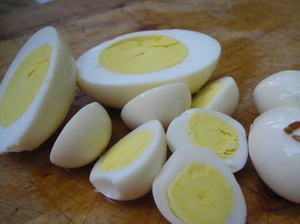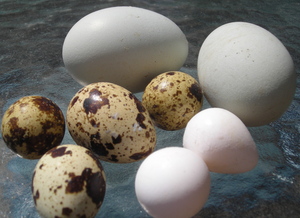Preserving Eggs: pickle or pack

The yolk color remained intact after pickling quail eggs and chicken eggs for a month.
Corinna Borden | Contributor
I like her idea of “pack in sawdust, small end down.” I found more references to that method, many of them recommend rubbing the outside of the egg with salted butter to prevent the air entering the egg and packing in anything from salt to sawdust. I am going to collect fresh eggs, rub them in butter, pack them in flour, and see what happens in 6 months as an experiment.
Fannie Farmer’s second recommendation, “lime water,” was made from pouring boiling water over “unslacked lime” - now known as pickling lime.

Quail eggs are the perfect size for popping into your mouth.
Corinna Borden | Contributor
A month ago, Mike Smith of Solar Refuge Farm was selling quail eggs at the Westside Farmers Market and recommended to me that I pickle them.
I took the quail eggs home, hard-boiled them (with two of my green eggs from the girls) and put them in reused cucumber pickle brine. Today I ate my first pickled quail egg, and I am going to make more. Pickled quail eggs are bite-sized, pleasantly chewy, and have a nice bite from the pickling vinegar. I found the pickled chicken eggs too soft and mushy in contrast to the quail egg’s dense flavor.
The Upper Peninsula of Michigan has a long tradition of spicy pickled eggs as an accompaniment for beer. The tradition is so ingrained that the Michigan Tech Alumni page has a list of various recipes for spicy pickled eggs. According to Mother’s Kitchen the most famous place to get pickled eggs is B&B in Houghton. This recipe is posted on the MTU website and on Mother’s Kitchen.
Ingredients: 2 dozen hard-boiled eggs (peeled)4 cups vinegar
1 jar sliced jalapenos, including the juice
1 onion, chopped finely
1 cup water
1 tablespoon Tabasco sauce
1 tablespoon salt
Directions: Put peeled eggs in a large glass jar with a lid. Put remaining ingredients in a large saucepan and boil for 10 minutes. Pour over eggs and let steep in the refrigerator for a minimum of 3 days. Serve eggs in a paper cupcake liner with Frank's Red Hot Sauce, black pepper and plenty of the jalapenos.
Pickled quail eggs worked for me because there is only so much brine that I want to ingest. Spicy pickled eggs are a good next step as I work to preserve our summer egg bounty from the girls.
Corinna volunteers with the Westside Farmers Market and wrote a book about many things.


Comments
Moms Kitchen
Thu, Jul 29, 2010 : 4:59 p.m.
Thank you Corinna for the shout out... Pickled eggs rock!